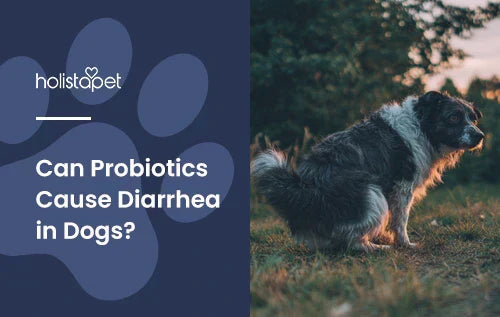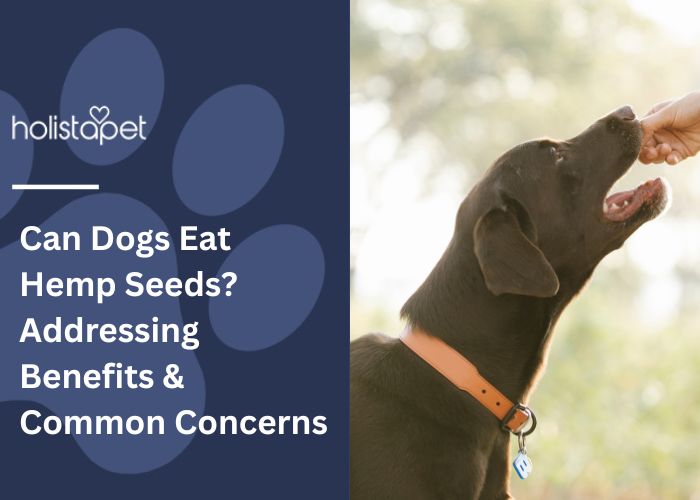So, can probiotics cause diarrhea in dogs? Yes, it's possible, particularly when you introduce them too quickly or provide too much. These helpful microorganisms work hard to restore gut health. But that adjustment period sometimes stirs up short-term tummy troubles.
Regular probiotic intake supports smooth digestion and a healthy immune response. We recommend a slow and steady approach, starting with a small amount and gradually increasing it over multiple feedings. This helps your pup's system welcome the beneficial bacteria without getting overwhelmed.
What Are Dog Probiotics and How Do They Support Digestive Health?

Dog probiotics are live microorganisms that bring good bacteria into your pup's digestive system. They help reduce harmful bacteria and support a strong immune system. When taken properly, probiotics encourage smooth digestion, internal balance, and overall wellness.
These beneficial microorganisms also create short-chain fatty acids. These keep the gastrointestinal tract running smoothly and support long-term gut health.
Why Pet Owners Add Probiotics to Their Dog's Routine
Pet parents turn to probiotics because they support digestive function and immune health. Probiotics introduce beneficial bacteria that help maintain balance in the gut. This balance keeps harmful bacteria from overwhelming the tummy. They aid proper digestion and help fend off illnesses. Probiotic supplements can also support smooth digestion during dietary changes or antibiotic treatment.
Can Dogs Get Diarrhea from Probiotics?
Dogs can get diarrhea from probiotics, though most healthy pups handle them well. Gastrointestinal upset may show up when probiotics are first introduced or when given in high amounts. This happens because the new probiotic bacteria change the existing environment when they enter the system.
For many dogs, regular probiotic intake provides support without issues. Still, owners should watch for red flags to be sure. These include stomach discomfort, loose stool, or other short-term digestive changes.
Can Probiotics Give Dogs Diarrhea in the Short Term?
Yes, probiotics can give dogs diarrhea in the short term. When supplementation begins, the system adjusts to the new probiotic strains. This period may cause digestive discomfort, loose stool, or tummy aches for a few days. But the good news is that most healthy dogs adapt quickly.
Why Probiotics Sometimes Trigger Loose Stool
Loose stool can happen when probiotics shift the gut flora too quickly. These microorganisms start working right away, which can stir up the gastrointestinal tract. Dogs may show digestive issues as the new probiotics compete with harmful bacteria for space.
This reaction is often temporary. Once the healthy bacteria settle into balance, things should start working smoothly again.
Overfeeding or High Dosage
Giving too many probiotic supplements at once can upset a dog's system. High dosing floods the gut with new probiotics, which may cause diarrhea or discomfort. This sudden imbalance often looks like stomach upset or soft stool.
For most dogs, sticking to the recommended serving often keeps unwanted side effects at bay. A measured dose given consistently maintains proper bacteria balance and provides long-term support.
Sudden Introduction Without Transition
Introducing probiotics too quickly can upset a dog's tummy. A sudden change in their gut flora may trigger stomach upset, loose stool, or abdominal discomfort. Our canine friends need time to adjust to new strains. This is especially true if they have a sensitive digestive tract.
Giving probiotics slowly helps build healthy bacteria without overwhelming the system. A gradual approach can support digestion and reduce the chance of diarrhea.
Sensitivity to Specific Strains
Some dogs react poorly to certain strains, which can lead to digestive issues. Each pup's gut environment is unique, so a strain that helps one dog may cause loose stool in another. This sensitivity may show up as abdominal discomfort or changes in stool consistency.
Switching to a canine-specific probiotic often helps. These products match a dog's system more closely. This makes them easier to tolerate while they work in the body.
How To Tell if Probiotics Are Causing Diarrhea in Dogs
Probiotics can sometimes cause short-term digestive upset. It's important for owners to know if the loose stool comes from probiotics or something else.
Watch for consistent digestive changes. If discomfort shows up only after introducing probiotics, the link may be clear. Pay attention to timing, stool changes, and other signs that point to dog probiotic side effects. Careful observation helps protect your dog's gut health and beyond.
Common Symptoms To Watch For
Dogs may show clear signs if probiotics are causing them digestive upset. These signs often appear soon after intake begins. Pet parents should watch their dogs closely during this period.
- Loose Stool. More frequent or watery bowel movements.
- Abdominal Discomfort. Signs like whining, restlessness, or stretching.
- Gas. Noticeable bloating or increased flatulence.
- Reduced Appetite. Turning away from food or eating less than usual.
- Lethargy. Lower energy levels or unusual tiredness.
Distinguishing Digestive Adjustment vs. True Intolerance
Short-term loose stool often signals a simple digestive change, not a serious problem. As new bacteria strains settle in, gut balance may shift quickly. This can cause temporary digestive upset. Such issues usually clear up within a few days as the system adapts.
True intolerance looks different. If loose stool, tummy discomfort, or reduced appetite continue, it may mean something else. For example, the probiotic supplement or strain might not be in harmony with the dog's gut environment.
What To Do if Your Dog Gets Diarrhea from Probiotics
Mild diarrhea from probiotics for dogs usually passes, but you can take steps to help. Start by checking how much probiotics your dog receives and adjust as needed. A smaller amount is often enough to provide support without causing problems.
- When To Reduce the Dose. If loose stool appears shortly after starting supplementation, try cutting back on the serving size.
- When To Stop and Call the Vet. If diarrhea continues, worsens, or comes with other symptoms, contact a vet for guidance.
Safe Ways To Give Probiotics to Dogs
Safe probiotic use begins with the right products and a steady plan. First, choose canine-derived probiotic strains designed for a dog's gut. These options usually support digestion better than human probiotics.
Also, add probiotics slowly to give your dog's system time to adjust. This gradual approach can bring them the support they need while reducing the risk of digestive upset.
Following Proper Dosage Guidelines
Following dosage instructions on product labels or from your vet is crucial. Doing so helps protect your dog's tummy. Too much at once can upset their digestive tract. But the right amount can support their internal balance. Serving size often depends on weight and health status.
Probiotic supplements work best when given regularly in the recommended amount. Sticking to the proper dosage can keep everything working smoothly over time.
Introducing Slowly To Avoid Stomach Upset
Introducing probiotics for dogs at a slow pace helps a dog's gut environment adjust. Gradual intake lets the healthy gut bacteria grow steadily in the digestive tract. A sudden dose of live microorganisms may cause digestive upset or loose stool.
You can mix small amounts of probiotics into your dog's diet and increase slowly. This method is your best chance to avoid stomach upset in your pooch.
Featured Product: HolistaPet Probiotics for Dogs
![Probiotics For Dogs [Soft Chews] - HolistaPet](https://cdn.shopify.com/s/files/1/0765/3946/1913/files/Probiotic-Infographic-1_472d7a29-e30c-435a-9638-1365d8c3a9f9.jpg?v=1725384841)
HolistaPet's Probiotic Soft Chews for Dogs stand out as a tasty and effective option for supporting your pup's gut health. Each heart-shaped chew contains 3 billion CFU (colony-forming units) from nine probiotic strains. Our formula is carefully designed to aid digestion and restore balance in the canine digestive tract.
These chews also feature sweet potato and pumpkin for extra digestive support. Suitable for all breeds and sizes, they keep your pup's digestive system on track every day and promote general wellness.
Preventing Diarrhea When Using Probiotics
Preventing diarrhea starts with smart probiotic use. That means introducing probiotic products slowly and sticking to trusted brands, like HolistaPet. Monitoring your dog's digestive system during dietary supplementation is also crucial. Adjust serving size if needed, and watch for side effects.
Monitoring Your Dog's Response
Watching how your dog reacts after starting probiotics is the best way to spot early issues. Loose stool, abdominal discomfort, or reduced appetite are some red flags. They may signal a need to adjust dosage.
By checking stool consistency and energy levels, you can track your dog's digestive health. Consistent monitoring keeps the gut microbiome balanced and supports healthy digestion over time.
Choosing Trusted Products Over Low-Quality Options
Not all probiotic options meet the same standards. Trusted brands, like HolistaPet, use carefully tested strains that match the canine digestive system. These products are specially designed to support dogs' gut health without unnecessary fillers.
Look for clear labels, strain variety, and tested potency. Remember, smart probiotic supplementation helps reduce the risk of adverse reactions.
FAQs – Probiotics and Digestive Issues in Dogs
Side effects and dosing are common concerns when starting probiotic supplementation in dogs. These things matter because every dog reacts differently to various probiotic strains. The following answers cover what you need to know to get started with confidence,
How long does probiotic-related diarrhea usually last?
Probiotic-related diarrhea in dogs usually lasts only a few days. This adjustment happens as gut bacteria shift. If loose stool continues beyond a week or worsens, it may mean intolerance or another issue. In such cases, seeing a vet is the safest step.
Should I stop probiotics if my dog gets loose stool?
If your dog develops loose stool, lower the dosage first and watch for changes. Many dogs adjust well to a smaller serving. If diarrhea persists or other symptoms appear, stop supplementation and contact your vet for help.
Can dogs take probiotics every day without side effects?
Most healthy dogs can take probiotics daily without side effects. Regular use supports gut balance, digestive health, and immune function. Sticking to proper dosage and using quality probiotic products helps avoid issues.
What's the safest probiotic option for sensitive dogs?
The safest choice for sensitive dogs is canine-derived probiotics. These contain tested strains and clear dosage guidelines. They match a dog's digestive system more closely than human probiotics. This makes them easier to tolerate while they work in the body.
Final Thoughts: Can Dogs Get Diarrhea from Probiotics?
Yes, probiotics can cause short-term diarrhea in dogs. But the good news is that pups adapt quickly and gain lasting benefits. With a slow introduction and the right dose, probiotic supplementation can support digestive health, immune function, and overall wellness.
Choosing trusted products should be your top priority. Look no further than HolistaPet. Our probiotics for dogs deliver reliable strains, tasty soft chews, and proven results. Give your pooch the balance they deserve—because a healthy gut means a happier, thriving pup.


 CBD Oil for Dogs - Fast Acting
CBD Oil for Dogs - Fast Acting
 Chicken Flavored CBD Oil For Dogs - Easy Dose
Chicken Flavored CBD Oil For Dogs - Easy Dose
 Salmon Flavored CBD Oil For Dogs - Highly Rated
Salmon Flavored CBD Oil For Dogs - Highly Rated
 CBG Oil for Dogs and Cats - Loved by Thousands
CBG Oil for Dogs and Cats - Loved by Thousands





Leave a comment
All comments are moderated before being published.
This site is protected by hCaptcha and the hCaptcha Privacy Policy and Terms of Service apply.